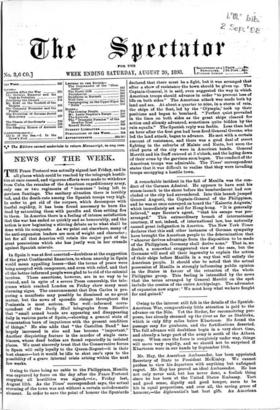Owing to there being no cable to the Philippines, Manilla
was captured by force on the day after the Peace Protocol stopping all hostilities was signed,—i.e., Friday last, August 12th. As the Times' correspondent says, the actual storming of the town was not without a certain melodramatic element. In order to save the point of honour the Spaniards declared that there must be a fight, but it was arranged that after a show of resistance the town should be given up. The Captain-General, it is said, even suggested the way in which American troops should advance in order "to prevent loss of life on both sides." The American attack was made both by land and sea. At about a quarter to nine, in a storm of rain, the ships of the fleet, led by the Olympia,' took up their positions and began to bombard. "Perfect quiet prevailed in the lines on both sides as the great ships cleared for action and silently advanced, sometimes quite hidden by the rain squalls." The Spanish reply was feeble. Less than halt an hour after the first gun had been fired General Greene, who led the land attack, began to advance. He met with a certain amount of resistance, and there was a good deal of street fighting in the suburbs of Malate and Emta, but soon the chief parts of the city were in American hands. General Merritt and his Staff entered at 3 o'clock, and the laying down of their arms by the garrison soon began. The conduct of ths American troops was admirable. The Times' correspondent states that it was difficult to realise that they were invading troops occupying a hostile town.


































